This piece comes to us from the Wildlife Conservation Society (WCS). To honor Women’s History Month, WCS and Nature are bringing you seven stories of women in the fields of nature and conservation.
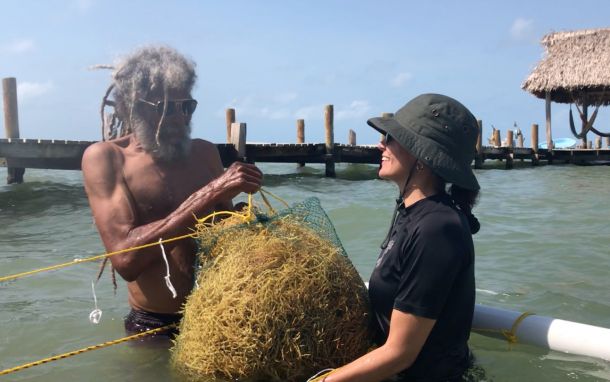
Nicole assisting trainer Lowell “Japs” Godfrey set up livelihoods demonstration of seaweed mariculture for Women in Fisheries Forum, June 2019. Photo credit: Deseree Arzu/WCS Belize.
I was in the midst of discussions about a potential partnership with other women from an organization who do not know me well—holding my left hand at arm’s length to maintain a “professional” expression to the computer’s camera while keeping my six-year-old from rushing at me in her anguish about…something.
Somehow, I kept it together and avoided embarrassment. But eventually, both camera and microphone had to be cut off so that I could swiftly settle my little one’s troubles then refocus entirely on the conversation.
It’s our new reality under COVID-19—one of split attention for at least half of our waking hours –disproportionately placing extra care responsibilities on women in the household, as per emerging research. As we celebrate Women’s History Month this year, my thoughts turn to the many women worldwide like myself who have had to balance demanding professional lives with the complexities of ensuring that our kids continue to thrive and our other loved ones are supported.
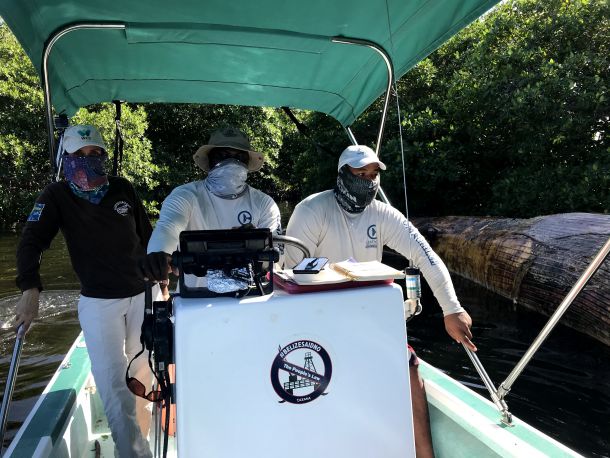
Nicole working with Clearwater Marine Aquarium Research Institute team to conduct an assessment of 18-meter fin whale carcass, Belize, May 2020. Photo credit: ©Cole Gomez.
This year marks my 5th anniversary as Country Director for the Belize Program of WCS (Wildlife Conservation Society). In that role, I am privileged to lead a hard-working team delivering on ambitious goals for the protection of wildlife and wild places every day, for the value and benefit of Belizean people and beyond.
Throughout my career, I, fortunately, had strong female mentors. It has been even more rewarding seeing younger women develop their passions and modes of safeguarding fragile ecosystems and populations. I am energized working with early-career biologists like Yamira Novelo, whose work focuses on the Critically Endangered hicatee—a Central American river turtle. These women are exploring and finding their niche the way I did when first enthusiastically starting my own professional journey.
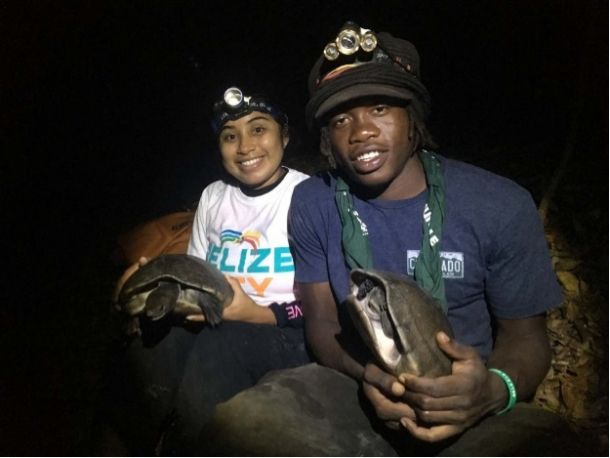
Yamira Novelo and Belizean researcher Jaren Serano, with Central American river turtles (locally known as hicatee), April 2019. Photo credit: ©Day Ligon
Nature has always captured my spirit, whether in my home country of Belize or one of the Caribbean islands I lived in as a child—fueled by trips to the beach, sand and mangrove islands, and small rivers with exhilarating rapids that wound through a pine forest.
Few places in the world can match Belize, home to the longest barrier reef in the Western Hemisphere, the Maya Forest, a variety of incredible wildlife, and rich cultural heritage maintained by Indigenous groups and local citizens. Here, amazing women steer national sustainability, resource management, and conservation efforts in their leadership roles in civil society, academia, or public service.
We come from different backgrounds, use different strategies based on our unique strengths, but we confront similar challenges, sometimes facing a lack of political will. We may have to shout a little louder to be heard by the policymakers and, unfortunately, often compete to be the voice that is listened to. Yet, we do the best work by forming alliances with one another.
As women, we are often better able to envision the future win at the end of a strategy and push through together. I feel proud writing that, but realize that we fall a bit short in the political arena, as women make up less than 25 percent of policymakers at the highest levels in Belize. That means too often men have the responsibility of developing and approving legislation. Our voices and actions on the ground have to be very strategic to influence that process.
Part of our role as women working to protect our nation’s unique natural assets is to inspire and nurture teams to exceed our own expectations. We’ve all heard conservation success stories that highlight the actions of a single person. In my day-to-day experience, few victories come from individual effort. It takes a team to achieve meaningful change in sustainable development.
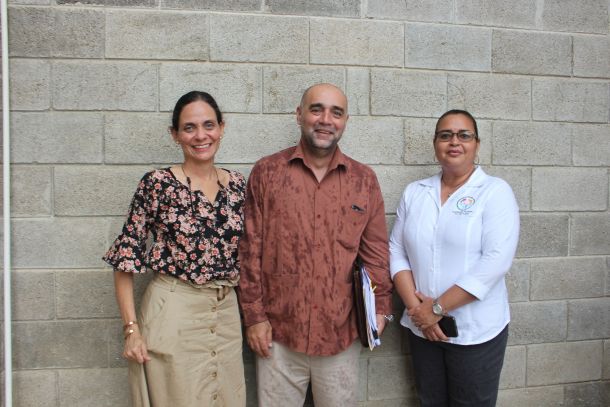
(Left to right): Nicole Auil Gomez; Dr. Omar Figueroa, former Minister responsible for fisheries; and Fisheries Administrator Beverly Wade at the National Assembly following the introduction of the Fisheries Resources Bill at the House of Representatives, January 2020. Photo credit: Deseree Arzu/WCS Belize.
One of our program’s most exciting gender-focused initiatives relates to women in fisheries. For the last three years, WCS has worked with the Fisheries Department to understand women’s invaluable role in the industry.
We execute a Women in Fisheries Forum to discuss women’s often-overlooked contributions to fisheries and fishery supply chains. While 3 percent of registered fishers are female, women also work in unseen post-harvest roles such as seafood processors, vendors, and wives supporting family fishing operations. We hope to host the next forum—on science in fisheries management decision-making—when the COVID-19 threat subsides.
Whatever the nature of the work, adaptive management is necessary for everyone. This year has been one of the most mentally stretched of my 24-year career in conservation. But, it has helped me become more introspective and find ways to be more resilient.
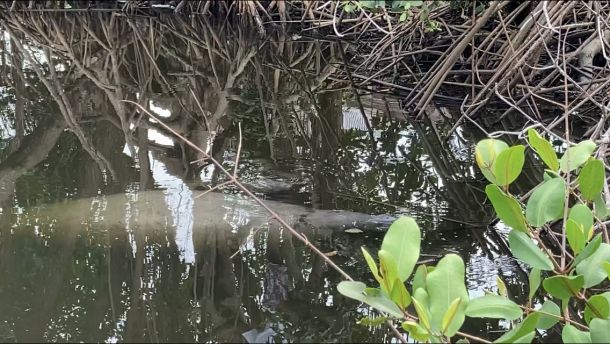
Injured Antillean manatee cow with calf, Belize City, January 2021. Photo credit: Nicole Auil Gomez/WCS Belize.
Key survival strategies that I learned in the chaos are to be gentle on yourself and keep close to support systems, both professional and personal. Team strength is also essential, from both within your working group and from collaborations with other organizations and individuals. Even in these uncertain times, we still need to act, make bold decisions, and have faith that things will come together.
When stretched, we can continue to be the change agents and the matriarchs. Together we will accomplish great things for this one planet, creating historical achievements even in the time of COVID-19.
